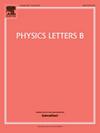软胶子耦合与TMD部分子分支Sudakov形因子
IF 4.5
2区 物理与天体物理
Q1 ASTRONOMY & ASTROPHYSICS
引用次数: 0
摘要
量子色动力学(QCD)中横向动量依赖(TMD)分布的演化可以用分子分支(PB)框架来表述。我们证明,通过使用软胶子物理耦合的概念,可以在该框架中实现次至次至前导对数(NNLL)精度。我们给出了TMD分布和Collins-Soper核控制快速演化的结果。该结果为在NNLL水平上对大型强子对撞机(LHC)和未来对撞机的物理观测进行PB预测铺平了道路。本文章由计算机程序翻译,如有差异,请以英文原文为准。
Soft-gluon coupling and the TMD parton branching Sudakov form factor
The evolution of transverse momentum dependent (TMD) distributions in Quantum Chromodynamics (QCD) can be formulated in a parton branching (PB) framework. We show that next-to-next-to-leading-logarithm (NNLL) accuracy can be achieved in this framework by using the concept of soft-gluon physical coupling. We present results for the TMD distributions and for the Collins-Soper kernel controlling rapidity evolution. The results pave the way for PB predictions at NNLL level for physical observables at the Large Hadron Collider (LHC) and future colliders.
求助全文
通过发布文献求助,成功后即可免费获取论文全文。
去求助
来源期刊

Physics Letters B
物理-物理:综合
CiteScore
9.10
自引率
6.80%
发文量
647
审稿时长
3 months
期刊介绍:
Physics Letters B ensures the rapid publication of important new results in particle physics, nuclear physics and cosmology. Specialized editors are responsible for contributions in experimental nuclear physics, theoretical nuclear physics, experimental high-energy physics, theoretical high-energy physics, and astrophysics.
 求助内容:
求助内容: 应助结果提醒方式:
应助结果提醒方式:


